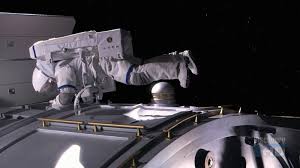Race to Mars (2007+)
IMDb meta-data is four episodes of 46 minutes each, rated 6..8 by 287 cinematizens.
Genre: Sy Fy fact
Verdict: Only for Mars junkies.

An international team (code for American, though all the actors are Canadian only one wears that flag patch in this Montréal production) embarks on a two year mission to Mars in 2030. The trip is long, the arrival short. Along the way the main obstacles are boredom and the shortcuts taken by the McKinsey-managed low-bid contractor. Yes, it is all very realistic. Produced by Discovery Canada, great pains were taken to get the science right. It is shot in HD and looks great.
Computer faults arise en route and have to be worked around, not once but twice. ‘That should work’ fixes don’t (fix it) and more fundamental efforts are needed. That is an IOS update while in flight. I did warn them against Catalina, but as usual shouting at the screen has no effect.
When the crew members were selected for compatibility they must have had some surgery because there is not a spark of sexual tension in the nine month close quarters voyage among the four men and two women. Definitely rated G on that dimension. There are a few expletives by way of compensation.
The master narrative in the title is that the Chinese have sent a robot ship to Mars to drill for water (as the source of life). Though launched shortly after the International Mission, the Chinese craft will get to Mars first. Why? Because it is robotic and without a human crew it can travel faster. It does not need to provide artificial gravity. It does not need to liftoff slowly so as not to crush the crew It does not need a long and slow deceleration to allow the crew to adjust. It does not need to dock and change crafts for ascent and descent. The one bus will make all stops. But will it get to water first, that remains to be seen.

Much time and effort is expended in landing, assembling equipment, withstanding the first dust storm, and setting up the drill. They do not do any exploring and there is never any discussion of that. No one wants to look around. Instead we have occasional views of travelling matte expanses. (This was not filmed in either Jordan or Morocco and it shows. These countries are favourites for big-budget Mars scenery.) They were sent to drill, and drill they do.
One of the Red Shirts breaks his arm in arraying equipment, and that increases everyone else’s workload. This is an industrial accident, not a Martian curse, and at this point the fraternity brothers passed out. Later another low-bid contractor puts in an appearance when the drill breaks.
Meanwhile the Chinese robot ship (very much like the cute little June bug spacecraft in Mission Stardust [1968], see comments on this film elsewhere on this blog) has struck….salt water. There is so much salt that no life could exist in it. Think Dead Sea and there it is. Think of the Great Salt Lake. No, wait, don’t. Anyway the smarty-pants Chinese have come up with nada.

Then off-camera, with the consent of ground control, suitably lagged for communication, our heroes get permission to cannibalise the Chinese rig for its drill, and they spend the best part of one forty-minute episode fitting it to their equipment, measured in inches, while the Chinese used abaci. (Joke.)
Not soon enough they hit water because their drill site is far away from the area the Chinese used and they have a geyser. In fact, it is too much and it blows the rig apart and shrapnel kills the Red Shirt. Much guilt follows, but no Christian ritual.
Now they have water and it seems anti-climatic since the samples are sealed and will only be analysed later on the ground after this series has long ended. Oh. It is all race and no finish.

Though there is much docking and rendezvousing which is passed in silence, and they start back when more computer failures threaten everything and no sooner is that fixed, then a damaged panel requires the Sy Fy mandatory EVA in which another member of the crew is injured. Was their equipment built by Trabant? Then they return to Earth orbit. The End.
No meteor showers, no flesh-eating plants, no exploding heads, no monsters of the deep, no creepy caves, no crappy special effects, just hard work and difficult decisions, industrial accidents, personal tensions, though the captain seems to wear his decisions lightly. That seems far fetched in such small group. The more so considering there is no military discipline in sight. I would expect more blowback. The extra shifts, first to compensate for the injured crewman, then to adapt the Chinese drill, then to make the deadline for the departure window, exhausts everyone. Tempers get shorter. Personal hygiene is absent.
I rather liked that low key approach, but the direction is leaden. The camera goes face-to-face for reaction shots every time a line is spoken. One speaks and we get five reaction shots. It lingers while the actor remembers the next line, and then on to the next actors. The result is that even the simplest scene is attenuated beyond its dramatic weight. While the asinine comments in user reviews about it are just that, it is also true that the film invites this reaction with its lethargic pace. It is one of slowest movies one is ever likely to see with the word ‘race’ in the title. Every actor gets plenty of close-ups for the demo disc without advancing the story or deepening the character
It was filmed in Montréal and I did not recognise any of the players but they all have extensive credits in Canadian television. It won several Gemini Awards for being Canadian. That the voice of ground control with an egregious Texas accent traces back to an Anglo actor from Montréal.
It is so low key that only one external reviewer was linked to the IMDb page when I looked. Moreover, or lessover there is not a single still photograph associated with the IMDb entry. This is the first time I have encountered that.

